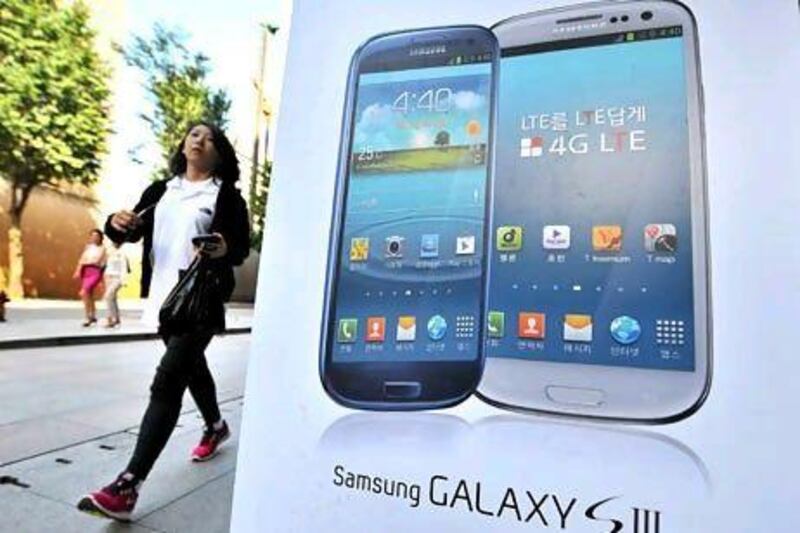The news on Friday that a court in the United States had ordered the South Korean phone manufacturer Samsung to pay US$1.05 billion (Dh3.85bn) in damages to Apple for infringing the Californian company's patents has caused chaos for operators in the mobile sector.
Shares in Samsung fell 7 per cent in Seoul on their first day of trading after the decision, their biggest one-day drop in almost four years.
Nokia, by contrast, looks like a beneficiary with its shares showing an early rise of 8 per cent.
Samsung, meanwhile, has announced it will appeal the verdict and complained about patent abuse.
But the truth of the Apple-Samsung contest is that success or failure in the mobile-phone sector is not just about technological innovation. It is about timing and ownership of technological innovation.
To try to ensure both, the technology industry has deliberately spawned a patent minefield.
Privately, large technology companies admit to patenting as much technology as possible, and writing deliberately misleading patents in the hope that a competitor will contravene them - the opposite of the purpose of patents, but one that is now seen as a lucrative income stream.
The point is to wait for a competitor to take the risks of developing a market, then demand a share.Such a tactic cheats the consumer by hamstringing development,and means that an innovator is likely to fall foul of patents he is unaware of because they have been hidden.
It is not being suggested that Apple has done anything quite so underhand, rather that, when Apple launched the iPhone, it took advantage of indecisions.
Virtually every mobile company was exploring the technologies that came to define the iPhone - touch-screen technology, a large high-resolution display, haptic feedback, the reassuring click when you touch a key, the elegance of the design.
There was much the iPhone had that seemed new - the trademark Apple operating system and interface, the touch screen, the elegant navigation. But the truth was that the iPhone was a marker in time.
The decision that made the reputation of the late Steve Jobs with the phone was to launch when he did.
It was a moment of decisiveness that meant that rather than Apple winning, all of the other mobile phone manufacturers lost.
Apple gained the momentum to push it nose, head and shoulders ahead of the opposition. The opposition had been dithering. There was nothing much that Apple did that was different from what all the manufacturers were working on - apart from the Apple interface.
A year before the launch of the iPhone the world of the mobile-phone manufacturers was a place of feverish innovation as companies manoeuvred to find the one component to redefine the mobile phone as the smartphone.
According to the theorists, we were entering the world of personalisation, and in an unpredictable market the mobile companies were determined to get it right.
Design concept houses were predicting a world where the mobile could abandon plastic and metal and be cased in leather, wood or stone to cater to a market for the distinct.
The mobile was becoming a fashion statement, something the analyst Gartner was keeping an eye on, seeing whether the beautiful people would achieve more design clout than the techno-nerds and the function diehards.
Other factors were keeping people awake at night, battery size and life, Wi-Fi and Bluetooth connectivity and the possibility that effective-voice recognition might emerge.
It was a minefield of possibilities that could suck up budgets, only for the company taking the risk to find that voice-recognition technology had conquered the final issue of achieving an accuracy higher than 97 per cent and the keyboard was redundant - wiping out entire assembly lines overnight.
As the iPhone proved, get it right and you win the house, get it wrong and you won't get room in the dustbin. For Mr Jobs the decision in a world of indecision must have been a simple one: "What is possible now? What do people want and how can I give them that?"
The answer was simple.
Make the most out of the one thing that you can do to reduce space - get rid of the keyboard and deliver the biggest screen you can, and incorporate the keyboard into it using the touch-screen technology being experimented with by all of the phone manufacturers. Create an interface that can take advantage of the latent appetite for personalisation that had not been effectively catered to and let people design their own interface on the screen.
The beautiful people got their expensive phone, the function diehards got a toy and the industry got an appetite they had to follow.
twitter: Follow and share our breaking business news. Follow us
iPad users can read the digital edition of business section as it was printed via our e-reader app. Click here





